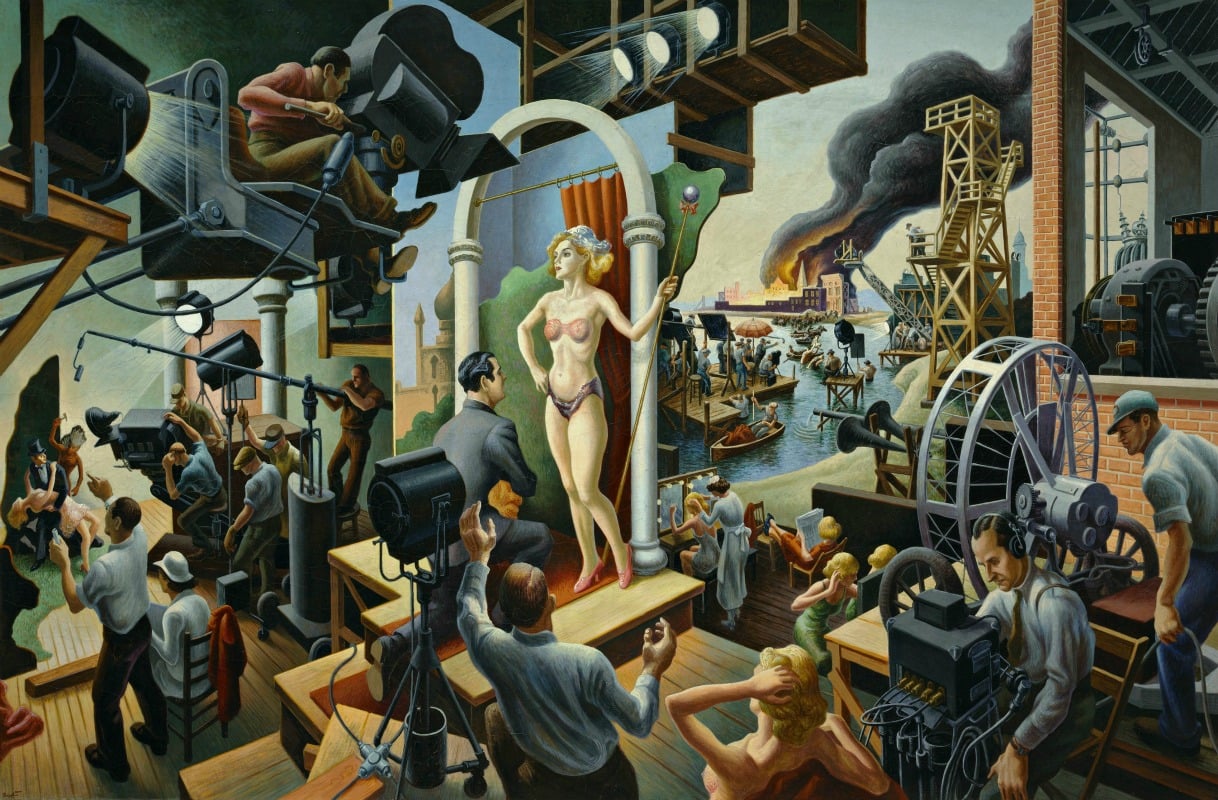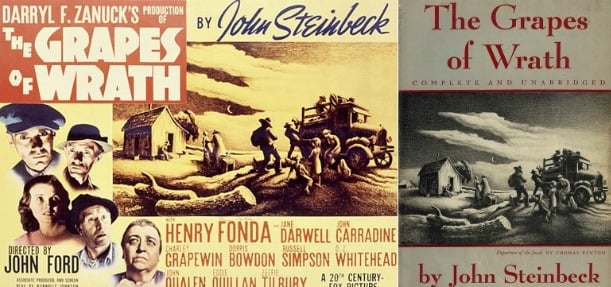Review: ‘American Epics’ And ‘Clever Little Lies’
ArtandSeek.net February 12, 2016 33
Reading minds: Bill Jenkins can’t keep any secrets from his wife, played by Linda Leonard, in ‘Clever Little Lies.’ Photos: Tim Long.
There’s a new off-Broadway comedy about marriage getting its Texas premiere at Fort Worth’s Circle Theatre. It’s called ‘Clever Little Lies’ and it’s been compared to classics by Neil Simon. Jerome Weeks sat down with Justin Martin to explain why Simon’s plays became the gold standard for domestic comedies — and just how clever ‘Clever Little Lies’ may or may not be.
Justin: Circle Theatre just opened its 35th season with the Texas premiere of the hit comedy, ‘Clever Little Lies’ by Joe DiPietro. It was a hit off-Broadway. So what’s it about?
Here she is, played by Linda Leonard, grilling her daughter-in-law Jane, played by Kelsey Melbourn.
Alice: You know you can tell me anything
Jane: No, Alice, there are certain things I can’t.
Alice: Like what?!
Jane: Like what I do with your son in the ah ….
Alice: Oh, you do DO something with him?
Jane: Oh, well, you know, we did just have a baby.
Alice: And that’s when the trouble starts! I have been there.
Jane: You’ve been where?
Alice: A new baby, a busy husband, your body going to hell.
That’s typical of DiPietro’s skills as a comic writer. The humor lies less in joke-jokes and more in the tension, the back-and-forth that builds to that last, blithely insensitive remark.
And the Circle production is expertly done when it comes to such character interplay. Director Stephen Pounders has guided a crackerjack cast with a sure hand, not only Leonard and Melbourn (who’s going to hear she looks like a younger version of Olivia Wilde a lot) but also Bill Jenkins and Jake Buchanan as the two husbands. They’re all comfortable with each other (Jenkins and Leonard are a real-life couple) and they all interact with a kind of crisp smoothness. A special note needs to be made of Jenkins’ open-mouthed horror when his son Billy reveals what’s troubling him. He’s at once appalled, sad, fearful and irked, and Jenkins’ face is like the ‘mask of tragedy’ turned into the mask of comedy. It’s a great bit of completely silent, physical comedy.
So the show — as a Circle effort — is just a smart job all around.

One big happy headache: Bill Jenkins, Jake Buchanan, Kelsey Milbourn and Linda Leonard in ‘Clever Little Lies.’
Now, ‘Clever Little Lies’ has repeatedly been compared to Neil Simon’s comedies. You’ll have to explain because I admit I’ve never seen a Neil Simon comedy.
So Justin, to help you understand, calling a stage play a Neil Simon comedy — if it’s intended as praise — means the play is an observant, well-made comedy with dependable laughs and no obscenities. It’s family-friendly. If the comparison is meant as criticism, it means the play is mostly safe and bland. It doesn’t really risk much.
So which is it with ‘Clever Little Lies’?

Thomas Hart Benton, ‘Hollywood,’ 1937–38, oil on canvas. Photo: Jamison Miller
Civil rights, the Vietnam war — and the resulting protests — the sexual revolution, and maybe Watergate along with everything that that entailed.
One might argue that none of those big-picture things concern Simon because a lot of that — Watergate, Vietnam — that’s all politics, and he’s after universal issues involving families and jobs, relations between men and women. Actually, it’d be hard to argue that something like feminism wouldn’t affect Simon’s material. But it turns out what’s ‘universal’ in that argument is what mostly applies to the middle-class and, in particular, to a very post-war, boomer sensibility.
What Simon and DiPietro write are basically comedies of manners. Nothing deeper. ‘Clever Little Lies’ is very contemporary with references to baby monitors and ‘Fifty Shades of Grey.’ But it stays focused on the same, well-to-do, little world that Simon did. Outside of the sexual language and the cellphones, very little has changed since, oh, Simon’s ‘Rumors’ (1988) or even ‘The Prisoner of Second Avenue’ (1971).
But these days, DiPietro knows he can’t keep things as morally tidy and safely enclosed as Simon once did. So ‘Clever Little Lies’ may end up affirming the values of conventional marriage and fidelity, but there are angry profanities here and a lingering sense of unease — precisely about the costs associated with marriage and fidelity. Ultimately, DiPietro does play it safe. But not as safe as Simon.
Oh, and one other way the Neil Simon label applies. If Joe DiPietro continues like this, he may well become our most commercially successful playwright since Simon. A year and a half ago, the Dallas Summer Musicals kicked off the national tour of the Broadway musical, ‘Nice Work If You Can Get It,’ a Gershwin throwback DiPietro scripted. ‘Clever Little Lies’ was successful enough off-Broadway to move to a bigger house, and then Circle Theatre got it. Theatre Three has brought back the comic revue, ‘I Love You, You’re Perfect Now Change,’ which DiPietro co-wrote and which the theater has run for 16 years. And in April, Theatre 3 will also present ‘Memphis,’ another Broadway musical DiPietro wrote.
All that’s just in North Texas. DiPietro is in his mid-fifties and he’s incredibly prolific. We’re sure to see more middle-class comedies of manners from him.
So you were impressed with something else in Fort Worth?
Benton was the great American mural painter of the 20th century. For him, murals existed to tell stories, so he crowded them with muscular, wiry, sculptural people, all of them doing stuff. He studied the Italian masters, and he developed a look that was very influential. Across the country, you can find sub-par Benton-ish murals in federal buildings and post offices from the ’30s through the ’60s.
And Austen Barron Bailey, the curator of American art at the Peabody Essex Museum in Massachusetts, saw the similarities with what moviemakers faced in telling stories on the big screen: how to define historic characters as larger-than-life, how to make the two-dimensional appear deeply three-dimensional.

Thomas Hart Benton’s art used to promote the 1940 film, ‘The Grapes of Wrath’ and John Steinbeck’s original novel.
Lots of people watch movies. Is there evidence for a specific link or influence?
But ‘American Epics’ also chronicles how Benton’s work declined, flattening out into poster-making and ugly jingoism during World War II. We move from sympathetic portrayals of black musicians and sharecroppers to ugly war propaganda. At the Amon Carter, the exhibition feels a little over-crowded — all those murals on wall after wall — but ‘American Epics’ is still the richest, most fascinating treatment of Benton’s work I’ve ever seen.
Thanks, Jerome.










